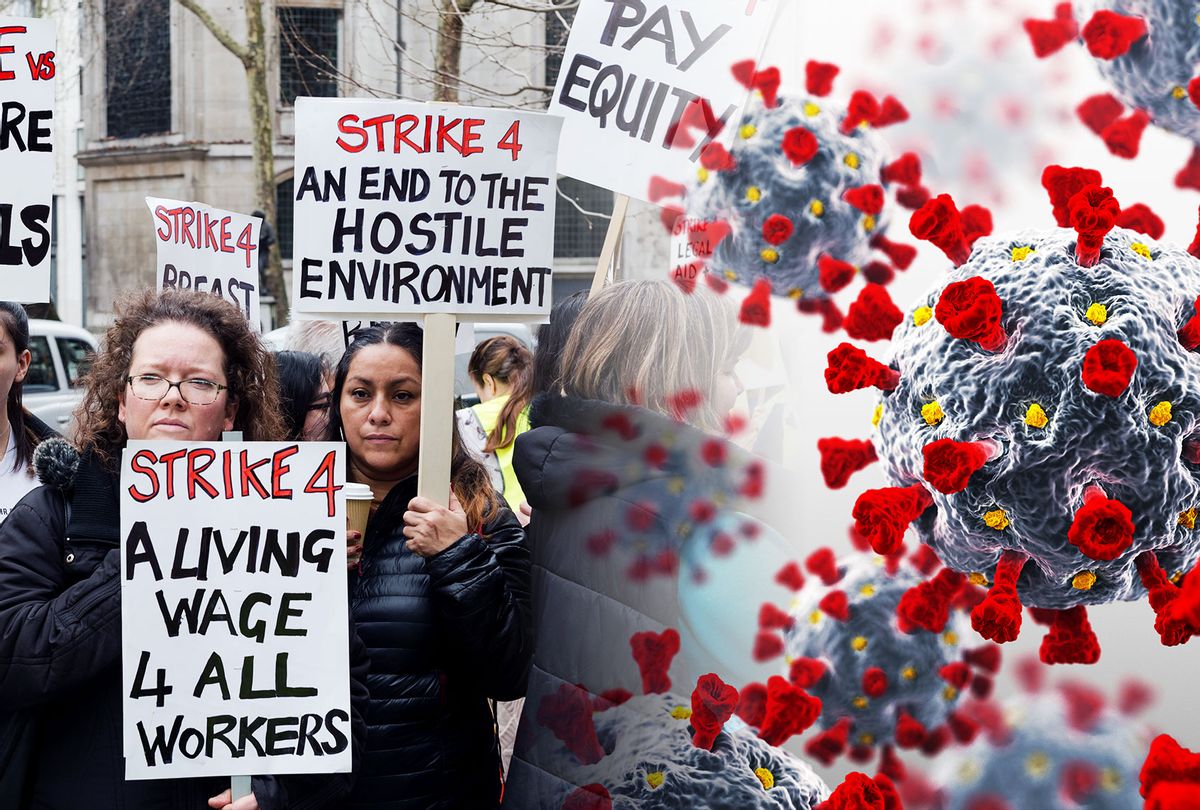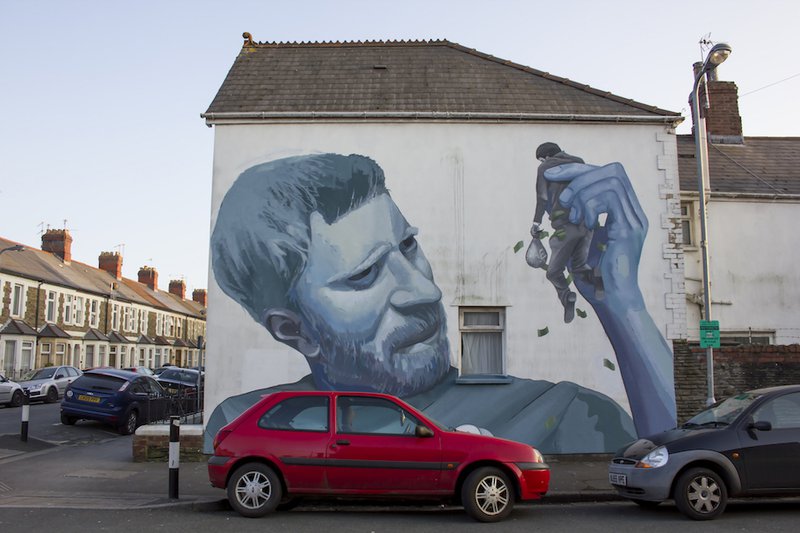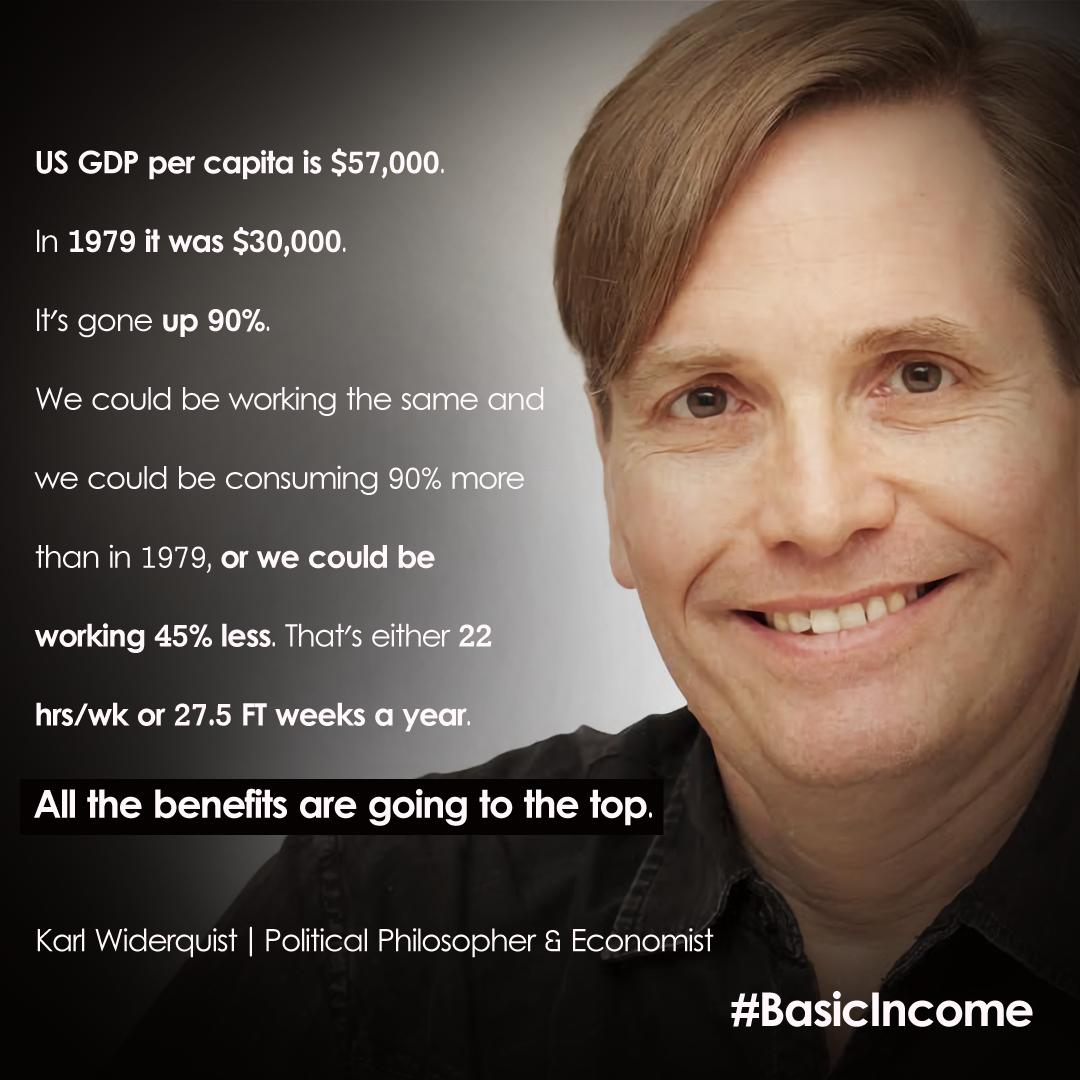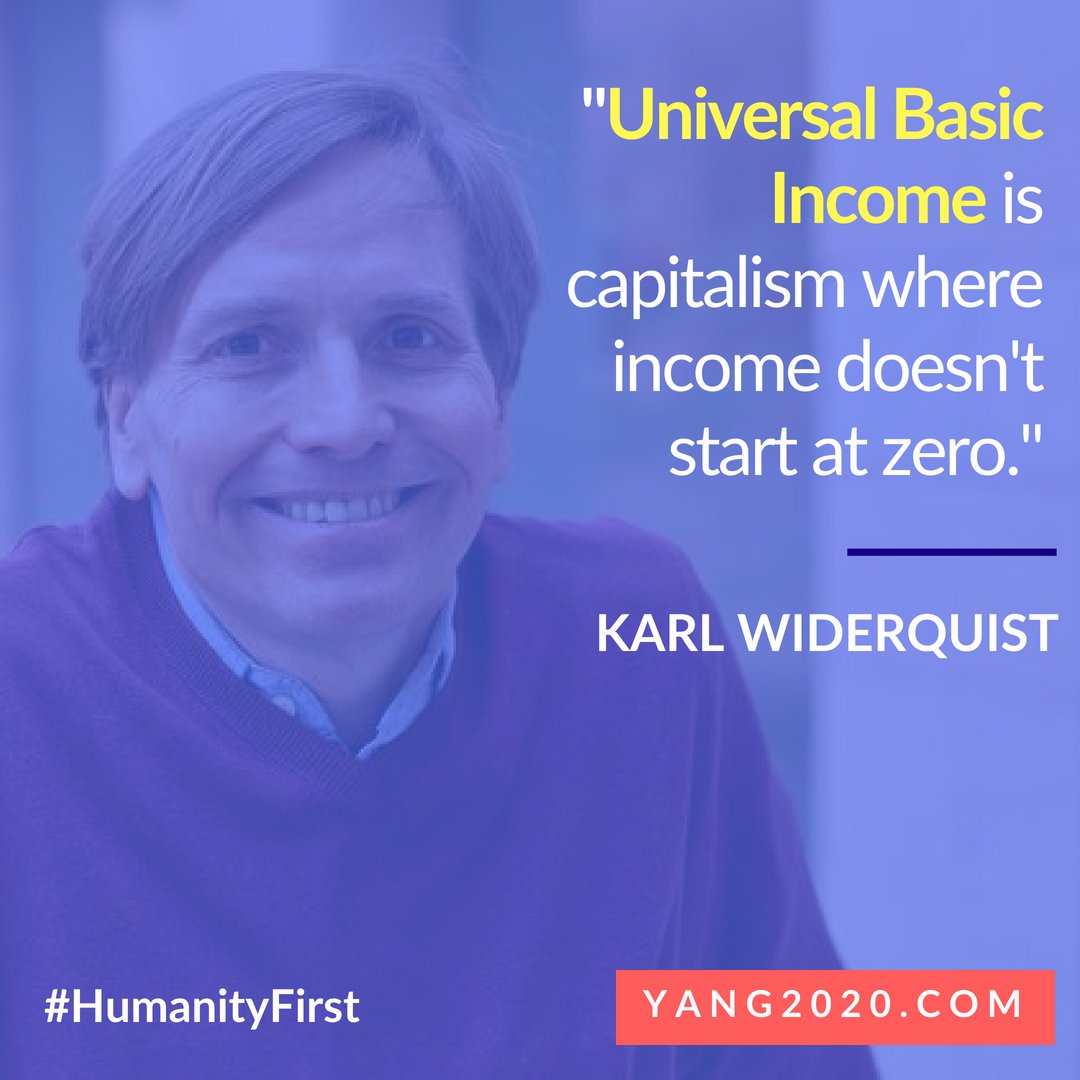
by Daniele Fabbri | Sep 11, 2018 | News
Annie Lowrey. Picture credit: ComedyCentral, The Daily Show
AUDIO: Annie Lowrey on Basic Income Podcast
Annie Lowrey, policy reporter for the New York Times and author of the book “Give People Money: How a Universal Basic Income Would end Poverty, Revolutionize Work, and Remake the World” joined the Basic Income Podcast to discuss her book and its reception.
In her interview with the hosts, Jim Pugh and Owen Poindexter, she says that in her book Universal Basic Income (UBI) is approached from a journalistic point of view, so as to benefit a generalized audience, or people who are not yet experts on the subject and may or may not have heard about it. She didn’t try to address only and directly UBI, but her effort was directed toward the ideas that intersect with UBI, creating a book that is intended to be, in her words:
“like a jungle gym where people could come and think and explore and didn’t feel like they were in a position to be persuaded as or not, so much as they were there to kind of get their minds expanded”.
Regarding the book’s reception, she says that while feeling pleased with the attention it received, there are still a lot of knee-jerk type of reactions, with the words “just give people money”, as eye-catching as they are, often hitting rooted believes and eliciting instinctive negative emotions. She believes, however, that there is still room for dialogue, as the movement for UBI has gained tremendous momentum. According to her, the Overton Window is opening, meaning that the vocabulary surrounding the subject is becoming acceptable, and the policy of UBI can be discussed publicly, and even accepted. A factor which could accelerate this process is, in her opinion, a possible recession of the economy: facing the accelerated effects of the great decoupling (when the increase in GDP and productivity is not matched by the increase in wages and occupation) would give a boost to the talk about UBI.
In the podcast, Lowrey also comments on the great variety of themes which are connected to UBI, and which make it possible to look at it from a myriad of different angles. From the economic standpoint, what she finds particularly interesting is what is counted and not counted in an economy. Categories of unpaid work, for example domestic labour inside the household go unnacounted, and that production could be compensated through the introduction of an UBI.
Noticing how the United States lack a safety net as robust as some other similar level income OECD countries, Lowrey states that the problem of racism certainly had its weight: “I do think that racism explains a lot of the welfare chauvinism that you have in the United States, a lot of the judgment of lower income folks.” She reasons that UBI, not being about requirements, but universal in nature, would also address the problem of discrimination.
Asked how she feels about the UBI movement right now, Lowrey says the United States are both close and far away from the introduction of a UBI. Even with Obama speaking favorably about it, and with news of possible upcoming trials emerging every other day, there are many difficulties left such as the requirement of funding, which is not easy to meet at the state level. Nonetheless, some states could take their Temporary Assistance for Needy Families (TANF) programs and turn them into an unconditional cash grant for children, she suggests.
“I would love it if you could get some kind of laboratory of democracy effect where you would have something smaller that could scale up that could really convince people it was a good idea”.
At the federal level, though, she thinks that it is more probable that some policies contaminated by the idea of UBI are put into practice, like a negative income tax or an Earned Income Tax Credit expansion. While she expects something along these lines to be proposed in the 2020 presidential campaign, she would be surprised if it was actually UBI.
More information at:
“Bringing UBI into the Public Discourse”, Basic Income Podcast, July 20th,2018

by Jason Burke Murphy | Jul 16, 2018 | Opinion
Interview with Democratic Presidential Candidate Andrew Yang
By: Jason Burke Murphy
[Note from Jason Burke Murphy. This interview took place on June 11th, 2018. Yang took time out of one of his presidential campaign rallies and fundraisers to speak with me. I describe the rally in US Basic Income Guarantee Network’s blog. After I stopped recording, he expressed his hope that supporters of basic income would get behind his campaign early. Andrew Yang was then, and still is as of this writing, the only announced candidate for the Democratic Presidential nomination.]
Murphy: How did you first hear about basic income?
Yang: I think I heard about it first for sure from Martin Ford’s book Rise of the Robots. I heard about it before then in articles but Martin Ford’s book made an impression. Andy Stern’s book Raising the Floor cemented the idea while coming from a different angle. Martin is a technologist and Andy is a labor leader. Stern’s book clinched it for me. I found myself coming to the same conclusion. Now basic income could no longer just be about technologists over-hyping the near-term progress of automation. Stern is someone who has a firm grasp on the labor market in the US.

Promotional for Andrew Yang’s book presenting his argument for Basic Income, Medicare for All, and “human capitalism”.
Murphy: How did friends and family react to your decision to run for President?
Yang: Oh, my parents were initially anxious and worried about it. Friends had a range of reactions. One cried tears of joy and has been immensely helpful. Others were skeptical. I will say now that support is very strong with friends and family. When you tell someone about a decision, they might react one way but when the decision is made in public, then they have a different attitude and stance.
Murphy: Joseph Biden, a possible candidate, has explicitly rejected basic income. It seems like other presumptive candidates have stayed quite distant. Why do you think that is the case?
Yang: I think in Joe’s case—and I read his comments—he is stuck in this framing of a subsistence model in which value is tied to showing up at an hourly waged job. His explicit argument for why basic income is a bad thing is that people need work. What he doesn’t realize is that universal basic income is pro-work. It is pro doing work that people actually want to do. Joe is stuck in an era when we thought that, if someone had a certain amount of money in their pocket, they would want to do nothing at all. That is an old welfare-era framework that I think was never true. [Laughs.] In Joe’s mind, that relationship is still there. Other Democrats are going to resist making commitments in this direction because they are afraid of being painted as “socialists” or economically unsophisticated. In truth, it requires a degree of economic sophistication to understand basic income and to see how it would be great for our economy and our people.
“Other Democrats in my opinion are not sophisticated enough to understand the impact a basic income would have in the economy… They do not realize that we would be channeling money back into our economy through the hands and the decisions of our citizens.”
Andrew Yang
Murphy: Do you think as people hear about basic income, they are going to think more about economics?
Yang: What happens right now is that people are stuck in this scarcity mindset in which they ask how we can afford it. Won’t it cause rapid inflation? Won’t it make purchasing power go away? None of that is true! [Laughs.] So, other Democrats, in my opinion, are not sophisticated enough to understand the impact a basic income would have in the economy. They are stuck thinking that the money would be “gone” and we would need to “go get more of it.” They are not realizing that we would be channeling money back into our economy through the hands and the decisions of our citizens. The vast majority of the money would be spent in our regional economy every day. The Roosevelt Institute’s estimates that it would create four and a half million new jobs and grow the economy by two and a half trillion.

Murphy: I really liked that paper. For one thing, it is methodologically very cautious. For another, I liked basic income before I knew it would be that good.
Yang: Yeah, their projection was based on it coming from deficit spending and they posited a lower impact if it was paid for by taxes. Whereas, I am very confident that, simply by shifting money to the hands of the people most likely to spend, you would induce economic growth. One thousand dollars a month in the hands of a really wealthy person does absolutely nothing. It just becomes a line item somewhere.
Murphy: Money in the hands of the wealthy, if spent at all, goes into the streets that are already looking pretty good.
Yang: It just stays in someone’s account. When money goes to anyone in the bottom half of the US population then it will be spent on things that will manifest themselves in local businesses in the community.
Murphy: One of the reasons I support a basic income is that I grew up in Arkansas. A region like the Delta is invisible politically. I just know that very few other approaches are going to get anything down there.
Yang: That’s right. Virtually nothing else.
Murphy: If someone has a big plan for education and job training, I am not against those, but I doubt it will actually get to the neighborhoods I worked in there in Arkansas.
Yang: You are right.
Murphy: How are you looking to fund a basic income?
Yang: The main way we need to fund it is through a value-added tax. A VAT is an efficient way to raise revenue, it taxes consumption, which is what we ought to be taxing instead of something like work and labor. We are the only industrialized economy that does not use the VAT. We would be harvesting the gains of automation and new technologies much more effectively than income-based taxes.
Murphy: There are a few other proposals like a carbon tax or a tax on income above the one percent. What do you think of these other proposals that pop up?
Yang: I think some proposals try to finesse something that cannot be finessed. We try to find a way to fund a basic income without causing any pain or friction. I support taxing carbon and we will tax rich people. But we are talking about re-organizing the way that value is distributed in our society. So we can’t think that we can do that in some elegant way that leaves most people untouched.
[Note from Murphy: Yang’s platform also includes a financial transactions tax, which we did not discuss. There is also a call for an end to the current favorable tax treatment for capital gains and carried interest. That is not listed as funding for a BI.]
Murphy: Thinking of that, sometimes supporters present basic income as a reformist measure and sometimes others present it as a very radical transformation.
Yang: You can put me in the “radical transformation” category.
“Fifty-nine percent of Americans can’t afford to pay a surprise $500 charge. Our life expectancy is declining due to a surge in suicide. Seven Americans die of opiates every hour. Americans are starting businesses, getting married, and having kids at record low level or at the lowest in multiple decades. So, society is disintegrating and even very sick.”
Andrew Yang
Murphy: You are the first candidate [for the Democratic Presidential nomination] to announce. This is giving you access to curious people. I saw an article in which you were meeting with New Hampshire Democrats. That is a new crowd for basic income. How are these meetings working for you?
Yang: They are interested in what I have to say. Most of what I have to say revolves around the fact that we are going through the greatest technological and economic shift in human history. That is objective. That is data-driven. People find it very resonant. They sense that this is true. Most of our conversations are around what is happening with technology and labor and the economy and job polarization—all things that we are experiencing right now. One of the dangers of basic income right now is that it can seem like we are debating different versions of utopia. When we turn someone’s attention to the depth and breadth of our current social problems, we can talk about what can actually make a difference. The situation you saw in Arkansas is becoming more and more true for more and more Americans. May I give some of the stats that I feature in my book and in speeches?
Murphy: Absolutely.
Yang: Fifty-nine percent of Americans can’t afford to pay a surprise $500 charge. Our life expectancy is declining due to a surge in suicide. Seven Americans die of opiates every hour. Americans are starting businesses, getting married, and having kids at record low level or at the lowest in multiple decades. So, society is disintegrating and even very sick.
Murphy: We often use words like “self-employed” and “side hustle” for people who are…
Yang: Who are being exploited by a billion-dollar tech company that says “be your own boss” but pays you nickels on the dollar.
“We need to quit measuring everything based on GDP and profitability at the expense of human values. We should direct our energy towards thing that improve lives. The concentration of gains in the hands of a few is a toxic way to move forward.”
Andrew Yang
Murphy: Not long ago, we would hear people say that we need to choose between universal health care and basic income. Your platform simply has both. It seems like we are having a similar moment with a jobs guarantee. We keep hearing that we need to pick one or the other. It seems like many good people think that basic income crowds out something they are very concerned about.
Yang: That is an unproductive approach. We should not get lost in dueling utopias. If you are for universal health care, you should think about how much one thousand dollars a month will open up access to health care. If you care about gender equality and you want to see women avoid abusive workplaces and domestic situations—a thousand dollars a month could be vital. Let’s start with the cash because that will be the easiest thing to get done.

Opening page of Andrew Yang’s Presidential Campaign website.
Murphy: Your platform has multiple issues alongside basic income.
Yang: Definitely. I am all for single-payer health care and we can certainly do better with health than we are at present. That said, even after I win the Presidency, giving everyone cash will be easier to execute than universal health care. Andrew Stern points out that the government is terrible at many things but it is excellent at sending cash to many people promptly and reliably.
Murphy: Any ideas on how a basic income would affect foreign policy?
Yang: In the end, I think basic income will rationalize our spending, make us more optimistic, and smarter about our resources. Our citizens may end up less likely to want to lose a trillion dollars on military interventions worldwide.
Murphy: You call your worldview “Human Capitalism”. For some people “capitalism” refers to markets. For others, it refers to the domination of wealthy people.
Yang; First, I would agree with those who think that our current version of capitalism and corporatism is why our disintegration is happening. I am not a fan of continuing down this road. We have to reverse course as fast as possible. Reversing course, however, does not mean abandoning the things that have made capitalism effective. The problem is that our measuring sticks are all wrong. There are more effective ways to do things. Markets can help find the effective ways. We need to quit measuring everything based on GDP and profitability at the expense of human values. We should direct our energy towards the things that improve lives. The concentration of gains in the hands of a few is a toxic way to move forward. This is bad even for the so-called “winners” in society. Studies have proven that the winners in an unequal society are more anxious and depressed than the winners in a more equal society. This is enlightened self-interest. I can sympathize with anyone who thinks that “capitalism” is a dirty word. The first line in the description of human capitalism on our website is “Humans are more important than money.”
Murphy: Thank you for speaking with me between events. Is there any last word you want to make to readers?
Yang: I am hoping to get support soon from the basic income community. I have been campaigning for about four months. We are drawing from their ideas. We hope we can see them sign up because we need their support.
You may disagree with some item on my platform but I hope you can see that the direction and the spirit are right and that we can push a genuine conversation about basic income. We could really use their passion. We need a movement that recognizes that our community is disintegrating and that basic income is an essential answer. I hope that basic income activists can believe in this campaign.

Photo of Jason Burke Murphy (Left) and Andrew Yang (Right) shortly after this interview.
[Note from Murphy. Some portions of this interview were edited slightly for clarity as we moved from spoken word to written word. No content was altered. Thank you to Andrew Yang for taking time out of his campaign to speak with me. Thanks to Tyler Prochazka for proofreading.]

by Guest Contributor | Jun 29, 2018 | Opinion
Written by: Leah Hamilton, MSW, PhD
Democrats and Republicans don’t see eye to eye very often, but they can safely agree on one point: welfare doesn’t work. Liberals are concerned that an ever-shrinking social safety net reaches fewer and fewer families in need. Republicans worry that welfare benefits create dependence. They are both right.
The primary cash assistance program in the United States, Temporary Assistance to Needy Families, served 68% of low-income families in 1996. Today, only 23% of poor families receive assistance. This change has been largely brought about by the imposition of five-year lifetime limits (states are allowed to set lower limits) and stricter eligibility criteria. Welfare caseload reductions have been solidly linked to the rise of deep poverty in America, family strain and increased foster care placements. 1.46 million US households (including 2.8 million children) now live on less than $2 per person, per day (the World Bank’s measurement of extreme poverty).
Meanwhile, welfare eligibility rules designed to encourage independence have achieved the opposite effect. For example, though many states impose strict work requirements, states which loosen these rules actually see recipients move to higher wage, higher benefit work, presumably because they have the breathing room to search for a good job rather than take the first one that comes along. Similarly, in states with strict limitations on recipient assets, poor families are less likely to own a car, making it nearly impossible to maintain employment in areas without public transportation. Even worse, some researchers are discovering a “cliff effect” in which welfare recipients immediately lose all benefits (including child care assistance) after a small increase in income. As a result, many parents turn down promotional opportunities because they would be ultimately worse off financially. Any parent would make the same decision if it meant the ability to feed their children and afford quality childcare.
We must redesign this entire system. In the most prosperous nation in the world, it is ludicrous that children are growing up in the kind of deprivation we normally associate with developing countries. Simultaneously, we must ensure that no one is discouraged from growing their income or assets. One potential solution is a universal basic income, which would provide an annual benefit to every citizen. However, this idea comes with a hefty price tag and would either increase our national deficit or increase the marginal tax rate, both of which might be political non-starters. The simpler solution is a Negative Income Tax (NIT) which is potentially cheaper than our current poverty alleviation efforts. An NIT is a refundable tax credit which brings every household to the federal poverty level. The most effective way to do this is to decrease the credit slowly (for example, a $0.50 reduction for each $1.00 increase in earned income) so that there is never a penalty for hard work.
Researchers at the University of Michigan calculated what this might look like in practice. If a family had no income, their tax credit would be 100% of the poverty line ($20,780 for a family of three). If the family’s earned income increased to half the poverty line ($10,390), their tax credit would decrease to $15,585. The credit would phase out completely once the family’s income reached twice the poverty level ($41,560). This plan would cost roughly $219 billion per year and could be almost completely paid for by replacing most or all of our current poverty programs.
With this one simple policy, we can achieve many goals of both the left and right. Poverty would be eliminated overnight. Work disincentives would be removed. American bureaucracy would be significantly reduced. Families would be free to make financial decisions without government intrusion. And in the long run, we would save money. Childhood poverty alone costs the US $1.03 trillion (yes, trillion) per year. In the 21st century, eradicating poverty isn’t complicated. We’re just going about it in the worst possible way.
About the author:
Leah Hamilton, MSW, PhD is an Assistant Professor of Social Work at Appalachian State University. She received a BSW from Metropolitan State University of Denver, an MSW from the University of Denver and a PhD in Public Policy at the University of Arkansas. She served as a Foster Care Case Worker and trainer for five years in Denver, Colorado. Dr. Hamilton’s research interests include poverty, economic justice, and social policy.

by Andre Coelho | Jun 3, 2018 | News
Image credit: La Razón.
BONOSOL is a mandatory, non-contributory, central government social security program in Bolivia. It is unconditional in nature and started in 1997, having endured to this day, having risen more than 220% from 2008 through 2016. It disburses, at the moment, 404 €/year per adult over 60 years of age who does not benefit from a State pension, and 323 €/year for those in that same population cohort who benefit from a State pension. BONOSOL is, thus, a universal but cohort restricted non-contributory pension programme.
Although the programme targets people older than 60 years of age, its coverage includes all people older than 21 in 1995 (at the moment 44 years of age). It has also been suspended, soon after its start in May 1997, re-introduced with a different name (BOLIVIDA) on a 51 €/year value and then re-established again as BONOSOL in 2002, with a value of 206 €/year.
Nowadays, around one million people in Bolivia benefit from BONOSOL (with or without a state pension), also called Renta Dignidad, or about 9% of current population. There is no monitoring or evaluation processes for this programme, although the total fund from where payments are made is subject to annual audits. The annual cost is 0.25% of Bolivia’s GDP, and has been originally set up as a way to redistribute collected funds by the State, derived from the privatization process. However, despite, its longevity and growth along recent years, “studies have shown that at current levels of benefits in payment, the fund will run out much earlier than expected”. This might indicate a need to diversify the fund’s financing streams into the future.
More information at:
Jesus Paco, “Diputados aprueban suba de la Renta Dignidad”, El Deber, May 5th 2017
International Labour Organization, Social Security Department – Bolivia, Bonosol
Autoridad de Fiscalización y Control de Pensiones e Seguros: Requisitos Renda Dignidad













 CIRS,
CIRS, 




 “
“






